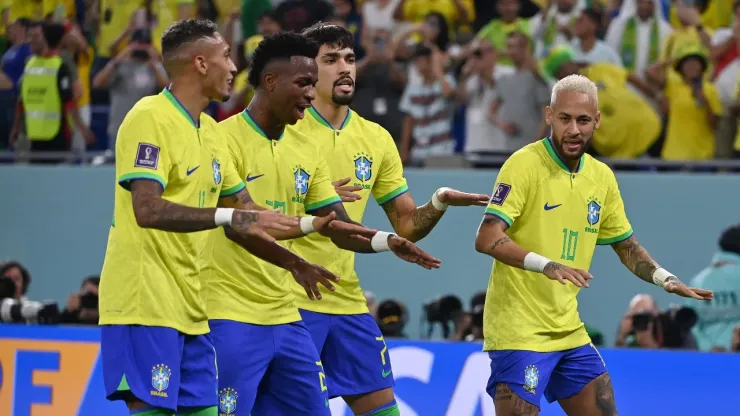
Brazil loves to dance, and it’s only natural that their representatives at the World Cup would dance as well. Richarlison’s signature Dança do Pombo, Paqueta’s fancy footwork, and Vinicius’ hip shakes have all gone viral over social media, so it makes sense that Brazilian songs have risen in popularity thanks to the Brazilian national team.
One genre of music that is catching fire, in particular, is funk carioca. Affectionately nicknamed favela funk, it is a traditional Brazilian style of funk. It grew from the different genres of samba and Latin music in Miami. Funk carioca exploded in the late 70s, coinciding with the rise of hip-hop in Miami and the United States. At first, the friendly and simple rhyming structure drew inspiration from Kool & The Gang, LL Cool J and Salt-N-Pepa. Then, with the song Feira de Acari, funk carioca began exploring mature themes; both politically and sexually.
Funk carioca soon achieved popularity throughout Brazil’s widespread favelas. Oftentimes, the artists spoke on things that directly related to people leaving in these areas. Drug problems, crimes and sex feature in Rap da Felicidade and Rap de Rocinha.
Funk carioca is more than just music
But funk carioca is not just a catchy genre, but also a stand against Brazil’s oppressive government.
Brazil’s government unsuccessfully attempted to ban funk carioca from the airwaves. Allegedly, it went so far as to shoot MCs advocating for the use of favela funk. But, it only became more popular thanks to the proibidão genre that criminal organizations and gangs sponsored.
The Brazilian funk we see all over social media is funk ostentação. This genre features songs centered around cars, drinks, sex, getting out of the favela and unnecessarily splurging on things not worth buying.
Funk carioca can be easily recognized by its subject matter. However, you can also point out favela funk with its electro-inspired, but uniquely Brazilian, tamborzão beat. The tamborzão translates to big drum in English, and it perfectly encapsulates the driving force of favela funk; the big drum that moves the songs along.
Samba was rejected for its Afro-Brazilian origins and working-class roots, but soon became popular with the Brazilian elite and became part of Brazil’s national identity. The same is true for funk carioca, the genre originating in the slums of Brazil, but soon becoming a popular music choice outside of the favelas and the country.
Many politicians and citizens voted to criminalize favela funk. For example, there are proposals to ban selling the music, hosting concerts or simply staging parties. Yet, popular politicians like former football star Romario and Spurs forward Richarlison promoted and defended funk carioca. It represents an exciting new generation of Brazil growing with a new president, a better economy, lower unemployment rates and a new catchy genre.
How music rose
With Brazil’s big wins, clips of Neymar singing the popular song Parado no Bailão while celebrating a goal four or so years ago resurfaced. Coupled with the Brazilian team’s high social media, we got clips of Richarlison, Lucas Paqueta, Raphinha, Vinicius Junior, and more dancing to songs like Se Voce Nao Quer Passa a Vez and Jogadinha de Paqueta.
The song Tubarao te Amo went viral on TikTok for two reasons. A massive post from creator Milena Almeida helped its surge. As did an associated dance with the song and fans creating numerous football edits. There are 1.7 billion views including that song on the platform.
Moreover, that song ushered in a new phase of Brazilian music in terms of popularity. Phonk is a fast-paced, cowbell-heavy music genre that originated from 90s Memphis rap. It became popular in 2020 with KORDHELL’s single MURDER IN MY MIND. It’s fast-paced and energetic but dark with deep beats. Paired with the booming tamborzão beat, it made for a perfect match. Brazilian phonk took over the monopoly funk carioca had over social media.
Attachment to football culture
Interesting stories
On Tiktok, the ‘Brazilian funk’ tag surpassed 242 million views, posts with the hashtag ‘Funkcarioca’ have 661.8 million views, #paradonobailao has 633.8 million views, and #tubaraoteamo has 1.7 billion views. In comparison, the USMNT tag has around 939.3 million views and #MLS has 3.1 billion views.
Although funk carioca has a huge presence online, Brazil’s most listened-to genre is sertanejo, a genre originating from the Brazilian countryside. It features lots of vocal harmonies, guitars, and the culture around sertanejo is somewhat similar to the Texan cowboy aesthetic some country artists rock. Richarlison (Dança do Pombo), Lucas Paqueta (Jogadinha do Paqueta), Neymar (Ô Neymar), Ronaldinho (Mega Sequência Do Ronaldinho), Thiago Silva (Thiago Silva) and Vinicius Junior (E o Pombo, E o Neymar, Vinicius Junior E Paqueta) all have songs that are named after them.
PHOTO: IMAGO / Sven Simon
200+ Channels With Sports & News
- Starting price: $33/mo. for fubo Latino Package
- Watch Premier League, Liga MX & Copa Libertadores
The New Home of MLS
- Price: $14.99/mo. for MLS Season Pass
- Watch every MLS game including playoffs & Leagues Cup
Many Sports & ESPN Originals
- Price: $10.99/mo. (or get ESPN+, Hulu & Disney+ for $14.99/mo.)
- Features Bundesliga, LaLiga, NWSL, & USL
2,000+ soccer games per year
- Price: $7.99/mo
- Features Champions League, Serie A, Europa League & EFL
175 Premier League Games & PL TV
- Starting price: $7.99/mo. for Peacock Premium
- Watch 175 exclusive EPL games per season